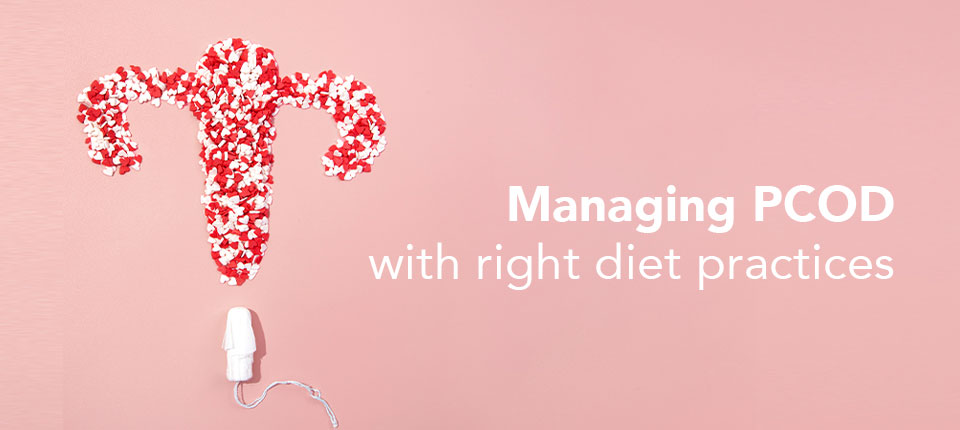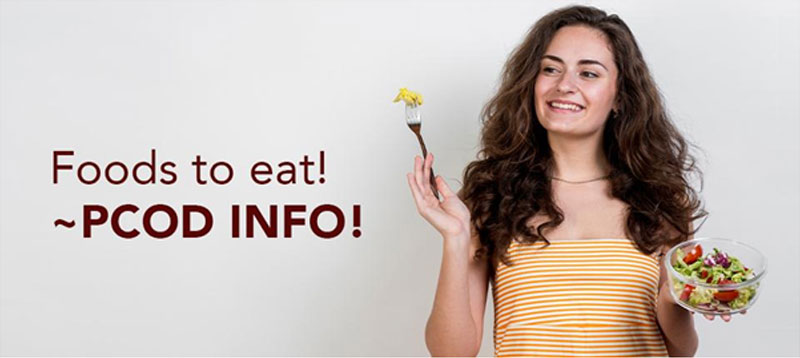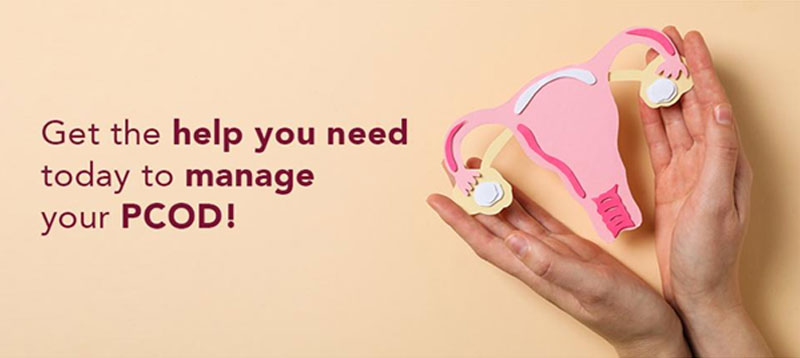
Reversing PCOD with right diet practices
Do you suspect you might have PCOD?

Let's do a very quick run down here for the points that may indicate PCOD:
- Irregular periods: Menstrual cycles vary or are absent.
- Excess hair: Unwanted hair growth on the face, chest, and back.
- Weight gain: Especially around the abdomen, difficulty losing weight.
- Acne: Persistent breakouts, especially along the jawline.
- Hair loss: Thinning hair or balding, particularly on the scalp.
- Dark patches: Skin discoloration, especially in neck folds.
- Fatigue: Constant tiredness, and lack of energy.
- Mood swings: Emotional fluctuations, irritability, anxiety.
- Infertility: Difficulty conceiving due to ovulation issues.
- Insulin resistance: Increased risk of diabetes, and metabolic syndrome.
However, remember to get a proper diagnosis that conclusively states you have PCOD, and refer to a gynaecologist!

Now, coming to how you can reverse PCOD, let's first answer the most important question;
IS IT POSSIBLE TO COMPLETE ELIMINATE PCOD?
According to Fertility & Sterility, while polycystic ovary syndrome (PCOS) cannot be completely cured, its symptoms can be managed effectively through lifestyle changes, medication, and sometimes surgery. Treatment aims to regulate menstrual cycles, manage symptoms like acne and excess hair growth, promote weight loss, and improve fertility. With early diagnosis and proactive management, many women with PCOS can lead healthy lives and minimize the impact of the condition on their overall well-being.

So, now that we have that out of the way, let's look at another very important question when it comes to PCOD; CAN PROPER DIET HELP MANAGE PCOD?
According to a research paper published on Dietary composition in the treatment of polycystic ovary syndrome, a balanced diet that focuses on whole foods, low glycemic index carbohydrates, lean proteins, healthy fats, and plenty of fruits and vegetables can help regulate blood sugar levels, reduce insulin resistance, and manage weight, which are key factors in PCOS management. Research supports the effectiveness of dietary interventions in improving symptoms and overall health outcomes for individuals with PCOS.
So, what can you eat and what practices can you follow to get the best out fo food to help manage your PCOD?

Let's first take a look at what you can eat:
-Whole Foods: Prioritize whole, minimally processed foods such as fruits, vegetables, whole grains, lean proteins, and healthy fats.
-Low Glycemic Index Carbohydrates: Choose carbohydrates that have a low glycemic index to help stabilize blood sugar levels. Examples include whole grains like oats, quinoa, and barley.
-Healthy Fats: Incorporate sources of healthy fats such as avocados, nuts, seeds, and olive oil into your diet to support hormone balance and reduce inflammation.
-Lean Proteins: Include lean protein sources such as chicken, fish, tofu, legumes, and low-fat dairy to support muscle health and promote satiety.
-Fiber-Rich Foods: Consume plenty of fiber from fruits, vegetables, whole grains, and legumes to aid in digestion, promote feelings of fullness, and stabilize blood sugar levels.
-Antioxidant-Rich Foods: Eat foods high in antioxidants, such as berries, spinach, kale, and other colorful fruits and vegetables, to reduce inflammation and oxidative stress in the body.
-Herbs and Spices: Incorporate herbs and spices like cinnamon, turmeric, ginger, and fenugreek into your meals, as they may help improve insulin sensitivity and regulate menstrual cycles.
-Omega-3 Fatty Acids: Include foods rich in omega-3 fatty acids such as salmon, sardines, flaxseeds, chia seeds, and walnuts to reduce inflammation and support hormone balance.
-Probiotic-Rich Foods: Incorporate probiotic-rich foods like yogurt, kefir, kimchi, sauerkraut, and miso to promote gut health and support digestion.
-Magnesium-Rich Foods: Consume foods high in magnesium such as spinach, kale, almonds, peanuts, black beans, and whole grains to help regulate blood sugar levels and support insulin sensitivity.
-Zinc-Rich Foods: Include foods rich in zinc such as oysters, beef, chicken, pumpkin seeds, chickpeas, and cashews to support immune function and hormone regulation.
-Iron-Rich Foods: Incorporate iron-rich foods like lean meats, poultry, fish, lentils, beans, tofu, and fortified cereals to prevent iron deficiency anemia and support energy levels.
-Vitamin D Sources: Get adequate vitamin D from sources such as fatty fish (salmon, mackerel), fortified dairy products, egg yolks, and sunlight exposure to support immune function and hormone regulation.
-Chromium-Rich Foods: Consume foods rich in chromium such as broccoli, green beans, whole grains, nuts, and seeds to help improve insulin sensitivity and regulate blood sugar levels.
-Cinnamon: Add cinnamon to foods and beverages as a natural way to help improve insulin sensitivity and regulate menstrual cycles.
-Turmeric: Use turmeric in cooking or drink turmeric tea to benefit from its anti-inflammatory properties and potential to improve insulin sensitivity.
-Green Tea: Enjoy green tea as a beverage rich in antioxidants and catechins that may help reduce inflammation and improve insulin sensitivity.

Now, let's take a look at practices regarding your food that you can incorporate into your life to manage PCOD symptoms:
-Portion Control: Practice portion control to avoid overeating and maintain a healthy weight, which can help improve insulin sensitivity and hormone balance.
-Mindful Eating: Pay attention to hunger and fullness cues, and practice mindful eating by savoring each bite and eating slowly to prevent overeating.
-Limit Processed Foods and Sugary Snacks: Minimize consumption of processed foods, sugary snacks, and beverages, as they can lead to spikes in blood sugar levels and worsen insulin resistance
-Hydration: Drink plenty of water throughout the day to stay hydrated and support overall health and hormone balance.
-Meal Planning: Plan your meals and snacks ahead of time to ensure they are balanced and nutritious, making it easier to stick to healthy eating habits and avoid impulsive food choices.
-Food Journaling: Keep a food journal to track your meals, snacks, and how they make you feel, helping you identify any patterns or triggers related to your PCOS symptoms.
-Cooking at Home: Prepare meals at home using fresh, whole ingredients whenever possible, allowing you to have more control over the ingredients and cooking methods used.
-Batch Cooking: Cook larger batches of meals and portion them out for the week, saving time and ensuring you always have healthy options available.
-Family Involvement: Involve your family members in meal planning and preparation to foster support and create a positive eating environment at home.
-Meal Timing: Aim for regular meal times and avoid skipping meals to help regulate blood sugar levels and prevent overeating later in the day.
-Balanced Plate Method: Use the balanced plate method to structure your meals, filling half your plate with non-starchy vegetables, one-quarter with lean protein, and one-quarter with whole grains or starchy vegetables.
-Portion Awareness: Practice portion awareness by using smaller plates and utensils, serving yourself appropriate portions, and avoiding oversized servings that can lead to overeating.
-Gentle Eating: Practice gentle eating by listening to your body's hunger and fullness cues, eating when you're hungry, and stopping when you're satisfied to maintain a healthy relationship with food.
-Choose Low-Processed Dairy: Opt for low-processed dairy options such as Greek yogurt, kefir, and cottage cheese, which are high in protein and probiotics and may help support gut health and hormone balance.
-Focus on High-Quality Protein: Prioritize high-quality protein sources such as grass-fed beef, free-range poultry, and organic tofu to support muscle maintenance and promote satiety, which can aid in weight management.
-Limit Caffeine: Limit consumption of caffeine-containing beverages such as coffee and tea, as excessive caffeine intake may disrupt hormone balance and exacerbate PCOD symptoms.
-Practice Intuitive Eating: Embrace intuitive eating by listening to your body's hunger and fullness cues, honoring your cravings in moderation, and rejecting diet culture's emphasis on strict food rules and restrictions.
-Explore Alternative Grains: Experiment with alternative grains such as quinoa, buckwheat, amaranth, and millet, which are gluten-free and may provide a variety of nutrients beneficial for PCOD management.
-Include Fermented Foods: Incorporate fermented foods such as kimchi, sauerkraut, kombucha, and miso into your diet to support gut health and enhance nutrient absorption, which can positively impact PCOD symptoms.
-Seek Professional Guidance: Consult with a registered dietitian or healthcare provider specializing in PCOS to receive personalized nutrition advice and support tailored to your individual needs and preferences.

You don't have to struggle with PCOD and it's negative effects. Help is right in your kitchen. All you need is a guiding hand to let you know the secrets of proper nutrition.
For that very reason, we're here to help you!